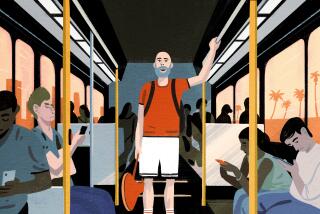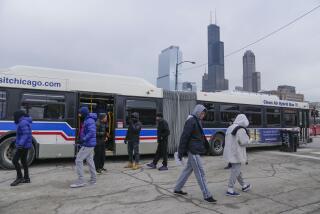Bus Busts Are End of Line for Florida Drug Couriers : Narcotics: Civil libertarians object to boarding, searching luggage. Supreme Court has upheld method.
LAKE CITY, Fla. — The Greyhound bus station on shady South Marion Street is painted pale blue. A sign over the doorway reads, “Welcome to Lake City.” For most travelers, a stop here means no more than a chance to use the bathroom and stretch the legs.
But for several people, this crossroads town has become not a stopover but an unexpected destination, due chiefly to an aggressive and controversial drug interdiction program in which local sheriff’s deputies board and search passengers’ luggage.
Prosecutor Tom Coleman says the bus-search program is an effective drug fighting tool in an area known as a “choke point” for the overland transport of drugs from Miami to the north. “And passengers thank officers. They feel safer,” says Coleman. “They don’t want people with drugs on the bus with them.”
But civil libertarians are appalled. “I remember being searched on a bus in communist Hungary by a guard with a machine gun,” said Herb Ellis, a local public defender representing several passengers arrested for drug possession. “This is similar. I’m just embarrassed that we’re willing to put up with this.”
The American Civil Liberties Union and others fear that the techniques being used here--approved last year by the U.S. Supreme Court--have become a model for police around the country. The Broward County Sheriff’s Department, which pioneered the bus-search program under its flamboyant chief, Nick Navarro, not only has trained Columbia County deputies, but police from several other states as well as from Britain and Guam.
Bus searches are conducted with the passengers’ permission. Columbia County deputies are trained to smile as they politely ask: “Mind if I search your bags?” They also explain that passengers may refuse, and they are instructed not to block the aisle.
But hardly any passengers refuse, even those who may be carrying cocaine or weapons. “Only about one in 20 say no,” said Sgt. John Jewitt, “If they say no, we just move on to the next person.”
And why would someone carrying illegal drugs or firearms OK a search? “It may be reverse psychology,” said Jewitt. “They think, ‘If I give permission, they won’t search.’ Or they may plan to deny the bag is theirs.”
Neither tactic works. In the past six months, deputies have seized seven pounds of cocaine, eight handguns and bagfuls of marijuana. Thirty-three persons, all travelers from out of state, have been arrested. About half of those have been charged with felony drug trafficking, Jewitt said.
Opponents charge the bus-search program targets poor people and relies on intimidation. “Most people are a little leery of saying no to a police officer,” says Dennis Roberts, the public defender for the local judicial circuit. “They don’t understand that they can say no.”
Indeed, without a search warrant or probable cause, police have no right to search anyone’s person or belongings. But bus searches have caught on in several Florida counties after the Supreme Court last year upheld their legality.
The decision stemmed from the Aug. 27, 1985, arrest of Terrance Bostick, then 29, who was on board a Greyhound bus en route from Miami to Atlanta when he was searched in Ft. Lauderdale, Fla. Almost a pound of cocaine was found in his blue bag.
In late 1989, the Florida Supreme Court, in a 4-3 vote, decided for Bostick. “Roving patrols, random sweeps and arbitrary searches would go far to eliminate (drug courier) crime in this state,” said the majority opinion. “Nazi Germany, Soviet Russia and Communist Cuba have demonstrated all too tellingly the effectiveness of such methods. Yet we are not a state that subscribes to the notion that ends justify means.”
But the prosecution appealed to the U.S. Supreme Court, where U.S. Solicitor General Kenneth W. Starr argued for the Bush Administration that Bostick was not seized; all he had to do was decline to have his belongings searched.
Washington lawyer and former Deputy Atty. Gen. Donald B. Ayer argued Bostick’s case, contending that the officers’ approach did signify a seizure, since Bostick assumed police were there “to carry out some specific, purposeful mission.”
In June, 1991, the Supreme Court ruled, 6 to 3, in favor of the police. “Bostick’s movements were ‘confined’ in a sense, but this was the natural result of his decision to take the bus,” said Justice Sandra Day O’Connor for the majority.
In a dissent, former Justice Thurgood Marshall said: “The majority blames (the) respondent for his own sensation of constraint. The Fourth Amendment clearly condemns the suspicionless, dragnet-style sweep of intrastate and interstate buses.”
(In October 1986, Bostick pleaded no contest to possession and was found guilty. Sentenced to five years in prison, he served a little more than 2 years and was out of jail before the Supreme Court ruled.)
Nowhere is the bus-search program practiced as vigorously as it is in Lake City, a town of 35,000 nestled in the hills of north-central Florida, halfway between Tallahassee and Jacksonville, just south of the intersection of two major interstate highways. At least four buses a day pull into the station here, and deputies are often there to meet them.
“We are never going to turn the tide against drugs; let’s get real here,” says Sgt. Jewitt. “But we’re not going to tolerate it either. The amount we seize might be a drop in the bucket, but it’s one less drop.
“We don’t trample on anyone’s rights at all,” Jewitt adds. “Remember, they have a right to tell us no.”
Roberts says that even if most bus passengers were aware of their constitutional rights, having an armed, uniformed officer looming over them “sort of overcomes most people’s will.”
“If sophisticated enough, they could refuse,” says Roberts. “But the average bus rider is from a lower economic strata, and he is not sophisticated. This strikes me as a situation we might have had in Eastern Europe, and it’s not something I’m proud to be associated with from a personal freedom standpoint.”
Ellis, an assistant public defender in Roberts’ office, says the bus searches target “one segment of society for a denial of equal protection.” Not only are those arrested poor, he said, but six of seven clients he represented lately were black.
“The amount of cocaine being seized per person harassed is minuscule,” said Ellis. “They would find that much at the airport or the country club. But they not going to those places.”
Under Florida law, persons found in possession of more than 28 grams of cocaine are charged with trafficking and face a three-year mandatory sentence. Of about 15 cases Coleman has prosecuted in the last few months, all have resulted in convictions. Most defendants have pleaded guilty.
Despite that record, some still worry.
“I think this is moving us further and further toward a possible police-type state,” says Kenneth P. Speiller, a Miami attorney who represented Bostick. “These things tend to eliminate the individual’s right to travel freely without being hampered by police. You’ve seen those old Nazi war movies, where they get on the train and say, ‘Show us your papers.’
“Drugs are carried around town, too. Are we going to start stopping people just because they’re walking on the streets?”
More to Read
Sign up for Essential California
The most important California stories and recommendations in your inbox every morning.
You may occasionally receive promotional content from the Los Angeles Times.










